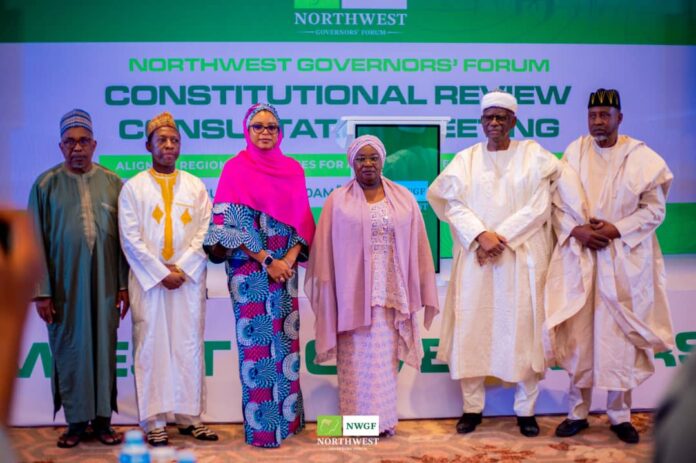Ex-Director General of NILDS Urges Stakeholders to Revise Revenue Formula
The Chairman of the Northern Nigeria Development Commission (NNDC), Alhaji Lamis Shehu Dikko, has advocated for constitutional amendments that would grant formal recognition to regional development bodies and address key governance challenges facing Nigeria’s federal structure.
Speaking at the Northwest Governors’ Forum Constitutional Review Consultative Meeting in Abuja today, Alhaji Dikko outlined strategic reforms needed to create a more equitable federation, emphasizing the need for balanced revenue allocation, enhanced local government autonomy, and constitutional empowerment of regional development institutions.
“The North seeks no favour beyond fairness, and no privilege above parity,” Alhaji Dikko declared while addressing the gathering of Northwest governors and constitutional review experts.
The NNDC Chairman proposed several key constitutional reforms, including a rebalanced federal structure that would transfer legislative powers in areas such as policing, agriculture, prisons, and minerals to state governments.
“We propose a rebalanced federal structure where states should legislate in areas such as policing, agriculture, prisons, and minerals, with residual powers returning to the states and the Exclusive List pruned to reflect subsidiarity,” he stated.
Addressing revenue allocation challenges, Alhaji Dikko called for reforms that reflect national equity principles, stating that the current system unfairly penalizes states without natural resources.
On regional economic coordination, he emphasized the constitutional recognition of development bodies, saying: “While the NNDC and other regional development companies such as ODUA should be granted constitutional recognition as regional development bodies empowered by law to coordinate regional enterprises and industrialisation with federal support.”
The NNDC Chairman also highlighted critical infrastructure challenges, particularly the uncommissioned 255MW Kudandan/Kaduna Power Plant, urging direct gubernatorial intervention with the President to resolve outstanding issues.
“The gas-powered plant was developed under the National Integrated Power Projects (NIPP) to supply electricity to the Kaduna-Kano-Katsina industrial corridor and stabilize the Northern transmission ring. Its commissioning is pivotal to unlocking industrial growth,” he explained.
Alhaji Dikko called for renewed Northern unity, stating: “This period of constitutional amendment should serve as a catalyst for more vigorous activities to unite the Northern Region again, the unconstitutional artificial fragmentation into North East, North Central and North West notwithstanding.”
He proposed the establishment of a Technical Working Group to frame actionable constitutional amendment proposals and urged mobilization of Northern Caucuses in the National Assembly to advance regional interests.
“Let us show the nation what unity looks like. Let us demonstrate that regional pride and national loyalty are not in conflict,” Alhaji Dikko concluded.
Additionally, Professor Muhammed Tawfiq Ladan, immediate past Director General of the Nigerian Institute of Advanced Legal Studies, presented a comprehensive analysis of constitutional amendment proposals and their implications for Northwest states during the ongoing consultative meeting.
In his technical presentation, Professor Ladan outlined critical areas where Northwest states show both consensus and divergence on constitutional reforms, emphasizing the need for balanced approaches to federalism.
Professor Ladan noted significant alignment among most Northwest states on security reforms, stating: “Most states—Kaduna, Kano, Katsina, Kebbi, Jigawa, and Zamfara—advocate for state police to address localised threats, while Sokoto rejects state police, favouring centralised policing to preserve national cohesion.”
He recommended adopting “a balanced policing model” that establishes state police forces where supported while maintaining federal oversight and coordination mechanisms.
On fiscal reforms, the legal expert harped on broad regional support for revenue formula revision, noting: “Fiscal federalism garners broad support for revising the revenue formula to boost state and LG allocations; Sokoto, however, rejects resource control and prefers pooling revenues nationally.”
Professor Ladan specifically referenced Katsina’s proposal for a new allocation formula of “Federal (45%), States (31%), LGs (24%)” as a practical framework for consideration.
He further emphasized regional consensus on local government reforms, stating: “All states support functional LG autonomy and direct funding, while rejecting federal control through a National LG Electoral Commission.”
Professor Ladan noted selective support for power devolution, explaining: “Several states push for transferring select items from the Exclusive to Concurrent List—like railways (Kaduna), mining (Kebbi), and labour/minimum wage (Jigawa). Sokoto rejects devolution of natural resources but supports tourism and quarantine on the concurrent list.”
The constitutional law expert recommended a phased approach to reforms, stating: “Begin devolving powers in targeted, low-risk sectors such as agriculture, tourism, and intra-state railways, allowing states to build governance capacity incrementally.”
Professor Ladan concluded that successful constitutional reform requires “achieving bipartisan consensus, crafting precise legislative amendments, and embedding safeguards that ensure transparent, consistent, and equitable implementation across all states in the region.”
The constitutional review meeting, convened under the theme “Aligning Regional Priorities for a People-Centred Constitution,” brings together governors, legal experts, and stakeholders to develop a unified Northwest position on constitutional reforms.
Press Released Signed By Ibrahim Kaula Mohammed Chief Press Secretary to the Governor of Katsina State




